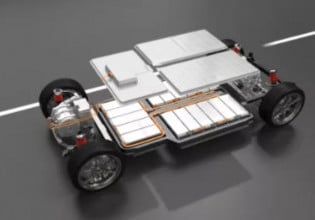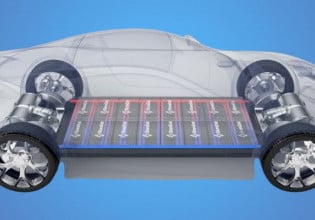Ford Invests in Solid Power to Develop Solid-State Batteries for EVs
Solid Power announced that it is partnering with Ford Motor Company to develop all-solid-state batteries (ASSB) for next-generation electric vehicles. Ford Motor Company invested in Solid Power for the partnership.
Solid Power says its ASSB technology offers increased energy density, and it improves safety and reliability compared to current industry-standard lithium-ion batteries. The announced partnership intends to further develop ASSBs to meet automotive requirements. Ford plans to take full advantage of Solid Power's first fully automated, roll-to-roll production facility, which is expected to be fully operational in Q2 2019.
The investment from Ford follows Solid Power's September 2018 announcement that it closed a $20 million Series A investment round. Ford Motor Company participated in a subsequent closing of that round, which included investors Hyundai CRADLE, A123systems, Volta Energy Technologies, Solvay Ventures, Sanoh Industrial Co., and Samsung Venture Investment Corp.
In December of 2017, Solid Power reported its collaboration with the BMW Group to develop Solid Power's solid-state batteries for electric vehicle applications and to tailor Solid Power's technology to meet automotive requirements for high-performance EVs.
"Solid-state battery technology has the potential to help us deliver electric vehicles that are even safer and more capable," said Ken Washington, vice president, Research and Advanced Engineering, and chief technology officer, Ford Motor Company. "Our involvement with Solid Power enables us to further collaborate in an important emerging technology that could truly transform the design and integration of smart electric vehicles into tomorrow's smart world."
"Companies like Ford are part of the movement that is changing the automotive industry and we are honored to be working together," Solid Power's co-founder and CEO Doug Campbell said.
"ASSBs have the potential to provide greater energy, which translates to greater run-time per charge or in the case of an electric vehicle, greater range from a fully charged battery. By combining state-of-the-art cathodes with metallic lithium anodes, ASSBs can achieve up to a 50% increase in cell level energy vs. current lithium-ion cells while even greater energy improvements are possible with more advanced cathodes, which is an additional area of development for Solid Power."
Advantages of Solid Power's ASSBs
Solid Power's ASSBs eliminate the flammable liquid electrolyte that is typically part of lithium-ion batteries. Thus Solid Power says that their ASSBs could potentially reduce system-level cost by reducing reliance on engineering solutions usually employed in lithium-ion systems to assure safe operation of the battery pack.
 Chart comparing Solid Power's ASSB technology to a lithium-ion battery (Click on chart to enlarge)
Chart comparing Solid Power's ASSB technology to a lithium-ion battery (Click on chart to enlarge)
Another benefit, of their ASSBs according to Solid Power is an increased energy density. As a result of this improved energy potential, Campbell pointed out that ASSBs are receiving heavy interest from a wide range of markets beyond ground transportation including aerospace, medical devices, and defense among several others.
Solid Power claims that its solid-state battery technology offers 50% higher energy density compared to current lithium-ion, which can increase at the module- and pack-level due to design simplicity. The company also says that its technology provides substantially improved safety because the design eliminates the flammable liquid electrolyte as used in lithium-ion batteries. Solid Power notes that its technology is also less expensive because the low-cost battery packs can minimize the required safety features and simplify thermal management.
Another advantage of the company's solid-state batteries is their high manufacturability due to their compatibility with automated, industry-standard, roll-to-roll production.






